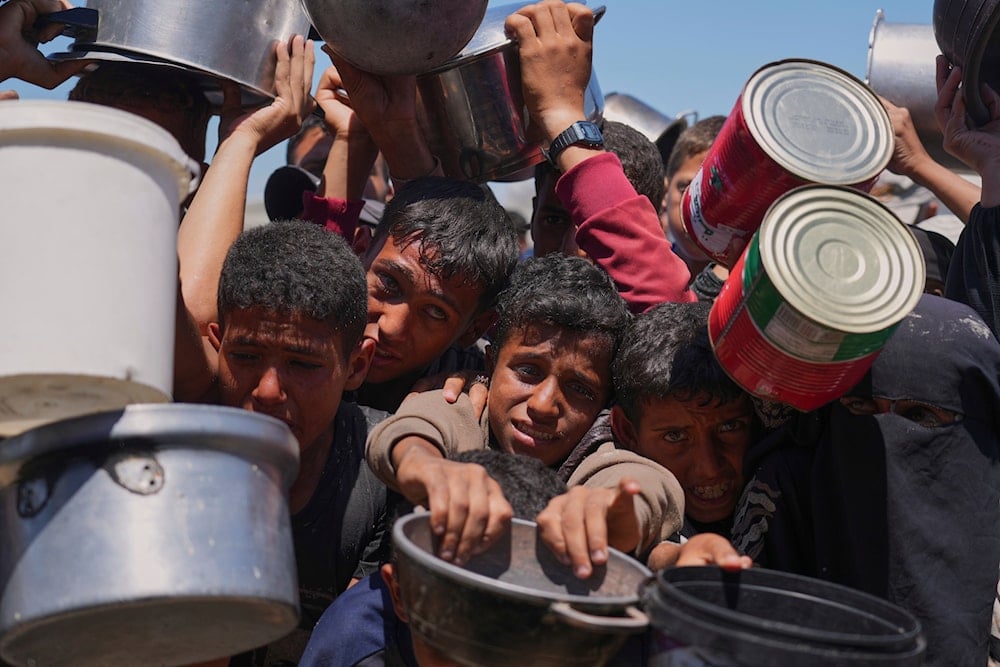Boston Consulting Group withdraws from GHF
The Boston Consulting Group withdraws from the Gaza Humanitarian Aid Foundation amid controversy surrounding its role and the mounting death toll from the aid massacres.
-

Palestinians struggle to get donated food at a community kitchen in Khan Younis, southern Gaza Strip, Monday, June 2, 2025 (AP)
The US consulting firm Boston Consulting Group (BCG) has withdrawn from the Gaza Humanitarian Foundation (GHF), a US- and Israeli-backed initiative to deliver aid to Palestinians amid the ongoing genocide, according to an exclusive by The Washington Post.
The decision, confirmed by a company spokesperson on Friday, comes as the foundation faces intensifying scrutiny over its operations, allegations of civilian harm, and massacres in Rafah.
According to The Washington Post, BCG played a critical role in establishing the foundation, helping to design the program’s logistics, manage financial operations, and coordinate with the Israeli occupation to build distribution centers in southern Gaza.
While BCG claimed its services were provided pro bono, a source close to the project said the firm had submitted invoices exceeding $1 million monthly. One of the senior partners overseeing the initiative has now been placed on leave pending an internal review.
The GHF is facing operational strain following the resignation of two senior executives and the collapse of coordination with humanitarian agencies. Nearly all major humanitarian organizations, including the United Nations, have refused to participate in the foundation, citing concerns over neutrality and an Israeli-imposed aid model that limits access and consolidates control, according to The Washington Post.
The Washington Post reported that BCG’s exit may cripple the initiative, as the firm helped establish the payment structures for contractors, the pricing of deliveries, and the day-to-day functionality of four key distribution hubs.
“They are actually making the wheels turn,” one source familiar with both BCG and GHF told the paper. As of Monday, three out of four hubs are operational in the south, open only for limited morning hours until food packages run out.
Controversial aid model faces operational and moral challenges
Despite mounting criticism, GHF claims success. In a statement, interim director John Acree said nearly 6 million meals were delivered in the first week of operations. “It proves our model is functional and is an effective means to deliver life-saving assistance to the Gazan people under emergency conditions,” he said, as reported by The Washington Post.
However, this distribution follows an 11-week total blockade during which the Israeli occupation prevented any humanitarian aid from entering Gaza, exacerbating the already dire situation for more than 2 million Palestinians.
Since the beginning of the Israeli aggression on Gaza in October 2023, more than 54,000 Palestinians have been killed, according to the Gaza Health Ministry. "Israel" has relocated most of the displaced population to the southern part of the enclave, while intensifying military operations in the north.
According to The Washington Post, armed US contractors have been hired to secure convoys and guard the hubs, further fueling concern that humanitarian aid is being weaponized to serve military strategy.
Internal documents obtained by The Washington Post show that even some senior Israeli security officials questioned the GHF model early on. They reportedly warned that the aid sites could lead to stampedes due to high demand and limited access. These concerns were ultimately brushed aside as the operation launched.
The United Nations and World Food Program continue to push for a different approach. Speaking to ABC News, WFP Executive Director Cindy McCain called the situation a “tragedy,” saying, “What we need right now is an immediate ceasefire, complete, unfettered access, along with the safe … roads, every gate open, to feed people and stop this catastrophe from happening.”
According to The Washington Post, limited UN convoys have been allowed to enter Gaza, but several were reportedly looted by desperate residents before reaching designated distribution points.
Aid experts say the GHF’s restricted model not only undermines impartiality but also endangers civilians by concentrating food access in just a few controlled locations.
“Whether we like it or not, ‘Israel’ is calling the shots in Gaza right now,” said one aid professional who declined an offer to lead the GHF. “We can either posture and be outraged, or accept it: Aid will never be provided in a neutral manner because of the heavy hand of the Israelis.”

 4 Min Read
4 Min Read








